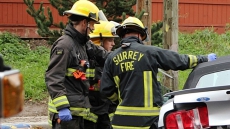OTTAWA — A federal review recommended better security and awareness training for personnel posted abroad after an employee at Canada's High Commission in Nairobi was killed during a terrorist attack on a shopping mall, newly released documents show.
The internal review also called for re-examination of the overall plan for responding to critical incidents overseas involving federal personnel, says a summary of the findings.
The summary, obtained by The Canadian Press under the Access to Information Act, flowed from a February 2014 meeting of interdepartmental task force members who had grappled with the horrors that unfolded in Kenya five months earlier.
On Sept. 21, 2013, al-Shabab gunmen attacked the Westgate Mall in Nairobi. Among those murdered in the assault was Annemarie Desloges, a Citizenship and Immigration Canada foreign service officer on assignment with the Canada Border Services Agency at the high commission. Vancouver businessman Naguib Damji was also killed.
Upon learning a federal employee may have been a casualty in the Saturday attack, the Security and Emergency Management Bureau of Foreign Affairs convened an interdepartmental task force meeting at noon eastern time, just under five hours after headquarters was alerted.
A number of things worked well during the emergency response, despite the fact the incident was "quickly evolving" and there was "a lack of clarity surrounding the nature and scale of the event," the review summary says.
For instance, the appointment of a liaison officer from Citizenship and Immigration as the single point of contact for Desloges' family was "absolutely vital."
However, the fact that Desloges was on assignment with the border services agency "caused a delay in CBSA becoming involved in the response," the summary says.
For missions such as Nairobi, where the high hardship level is largely a reflection of the security situation, personnel "are being made aware of the risks associated with working in difficult operating environments through the training they receive and the overall preparations they conduct prior to departing for the post," it adds.
Still, the review recommended enhancing Foreign Affairs' training and awareness program related to personal security abroad.
The review also found:
— Even though Foreign Affairs headquarters called for suspension of all non-essential requests to the Nairobi mission, multiple requests for the same information from various people poured in;
— It can take months to return to a normal state of operations following a crisis, and options for maintaining activity "need to be explored";
— Counsellors who met with high commission staff from Canada as well as local hires were "hugely appreciated," although some Kenyan employees preferred to talk with someone from a similar cultural background.
"Consideration should be given to identifying this additional resource earlier in the process for events of a similar nature in the future," the summary says.
Foreign Affairs had little to say about the status of the recommendations one year later.
"The Canadian government takes the safety of personnel at our missions abroad very seriously and reviews its security measures on an ongoing basis for all its missions," spokeswoman Amy Mills said in an emailed statement.
"We carefully monitor situations abroad on a case-by-case basis to implement appropriate measures to protect our personnel."






